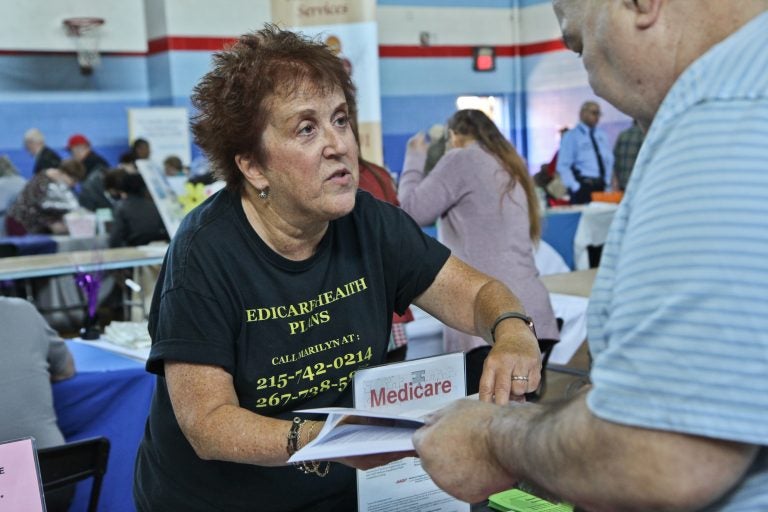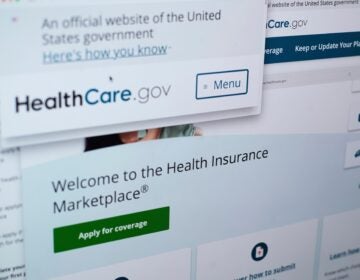Medicare open enrollments have started as benefits change for 2023
The Medicare open enrollment window started on Oct. 15 and will end on Dec. 7 for individuals seeking coverage in 2023.

File photo: Marilyn Burston is a benefits specialist, who helps seniors find an appropriate Medicare plan. (Kimberly Paynter/WHYY)
Medicare Open Enrollment is in its first week of a two-month application deadline for millions of eligible Medicare recipients.
The enrollment window started on Oct. 15 and will end on Dec. 7 for individuals seeking coverage in 2023.
The enrollment period is an opportunity for individuals 65 or older and young adults with disabilities to opt back into their previous health plan, or switch to one that best addresses their needs.
Last Saturday, the Biden-Harris Administration announced that current Medicare holders and new qualifiers will see significant changes to their healthcare costs after the passage of the Inflation Reduction Act, which was signed into law in August. The administration promises that eligible enrollees will see lower premiums than in years past, in addition to reduced costs for insulin and vaccines.
For Medicare specialists, helping enrollees decipher changes in their future health plans is key.
Zach Valentine, a Medicare regional coordinator for Southeastern Pennsylvania, said that one of the obstacles for enrollees during this period is sorting out what their options are.
“Our challenge is to try to help people understand what they currently have and help them understand what’s out there,” he said. “And maybe even how those things are different.”
He also said that the oversaturation of advertising, particularly from political campaigns, can make matters more confusing.
“Everyone faces a bombardment of advertising,” he said. “It’s overwhelming — between the television ads, the mail and even some unsolicited phone calls. It creates a very difficult environment to sift through all of the options.”
The primary options that enrollees have are Medicare Advantage, or the Original Medicare plan, which is also known as Part A and Part B. There’s also a Medicare Supplement plan, which depending on preference, Valentine said, might be reasonable for some more than others.
“Some people might prefer Supplement because they don’t want to deal with those co-pays or because they don’t want to deal with the networks that a Medicare Advantage Plan might come with,” he said.
Valentine also cautioned that past trends in the enrollment process need to be monitored. As recently as 2021, a study from the Kaiser Family Foundation found that 7 of 10 (71%) Medicare enrollees did not compare their plans during the enrollment period of 2018 for 2019 Medicare coverage. For Philadelphia, he said, there are dozens of Medicare plans, and choosing can be hard.
“Everyone’s situation is different medically as far as conditions, medications, and even just their own risk analysis,” he said. “Would you rather buy a more comprehensive plan for your future planning, your future self, or would you rather take those savings in the current moment and use that money elsewhere? A lot of it comes down to costs and budget and how much upfront you’re able to pay out.”
Those who are eligible are encouraged to make a decision that’s timely if they decide to enroll in coverage. Valentine said that even for last minute applications, as long as confirmation documents can be provided as late as the Dec. 7 deadline, enrollees will be protected.
“Always review your plan, either with a counselor or even with going online to medicare.gov.,” he said. “There is a plan finder on there that has all of the options available.”
Chris McDade, vice president of Medicare Integrated Health for AmeriHealth Caritas, said that Medicare recipients must be diligent about checking the status of the health plan.
“As the resident Medicare expert in my family and trying to help folks, my recommendation is always you have to review the benefits year to year,” he said. “You have to check what were the planned changes, what benefits may have been increased.”
McDade also said that Open Enrollment is “open season” for scams, especially ones that try to disguise themselves as members of a healthcare organization.
“Verify things thoroughly — call back to the customer service number if something seems a little off. Make sure you’re not disclosing things such as your Social Security number, your birthday, because those are things that scammers want to get access to. So trust your intuition and contact your health care provider directly.”
Support for WHYY’s coverage of health equity issues comes from the Commonwealth Fund.

Get daily updates from WHYY News!
WHYY is your source for fact-based, in-depth journalism and information. As a nonprofit organization, we rely on financial support from readers like you. Please give today.








